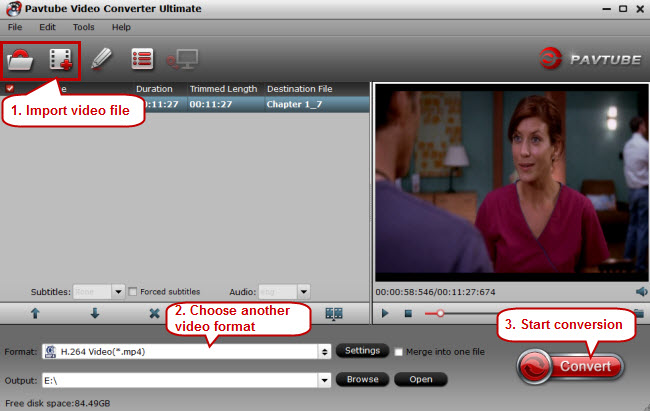HEVC is a successor to the well known H.264/MPEG-4 AVC video compression standard. HEVC promises the same level of picture quality as H.264/AVC, however, there will be better compression so the file size can be smaller. This is important when dealing with 4K or UHD media. As the resolution increases, the file size increases along with it. Although there are now few devices supporting HEVC, Plex won’t let you down ever with supporting both H.264/AVC and HEVC/H.265 direct playing.
Plex Direct Play Video Support
Native video support is typically (but not always) limited to the MP4 container, H.264 video encoding, and AAC audio. Content that is not natively supported will automatically be Direct Streamed or transcoded as needed by the Plex Media Server.
Learn >> ISO to Plex | MKV to Plex | TV Series DVD to Plex | AVI to Plex | Blu-ray to Plex
See the Specific Model Differences later in the article for more information about cases that may vary from this. Content matching the following can usually be Direct Played:
- Container: MP4
- Resolution: 1920×1080 or smaller
- Video Encoding: H.264 (level 4.0 or lower)
- Video Framerate: 30fps
- Video Bit Depth: 8
- Audio Encoding: AAC
Plex 4K (UHD) Direct Play Video Support
Some 4K (ultra high definition) devices are recognized by the Plex app. We’re working to bring 4K playback support to other devices, too. 4K/UHD content matching the following will Direct Play on supported devices:
- Container: MP4
- Resolution: 3840×2160 or smaller
- Video Encoding: HEVC (H.265)
- Video Frame Rate: 30fps
- Video Bit Depth: 8
4K content not matching the above properties will be transcoded to 1080p. Transcoding 4K content is a very intensive process and will require a powerful computer running Plex Media Server.
Rapid Encode Video to H.265 Using GeForce GTX 900 Series with NVIDIA HEVC Encoder
" I have been waiting a long time for Plex to be able to support HEVC. But alas, encoding a movie in x265 took 3 days to encode on my 8 core 32GB computer. I have a video card (GeForce GTX 960) that supports hardware encoding, but I was unable to find software to support the encoding."
Now, there is a new version of Pavtube Video Converter Ultimate (trialware) that supports Nvidia H.265, Nvidia H.264 and Intel H.264 hardware encoding as well as other common encoders. You can now encode a 1.5 hour 1080p video in HEVC in about 20 minutes. And the quality will be very good and am very impressed. If you have a Nvidia video card that supports H.265 encoding (Kepler), you might want to check it out. H.264 hardware encoding is supported on many of the older Nvidia cards. To use NVIDIA HEVC hardware encoding, you have to have the appropriate hardware. You can see if your Graphics Card supports NVIDIA HEVC CUDA acceleration here.
Pavtube Video Converter Ultimate v4.9.0.0 and higher version support the most advanced hardware acceleration NVIDIA CUDA & AMD APP by H.264/H.265 codec, which can give users 30x video transcoding speed than before. Learn more about Pavtube Video Converter Ultimate v4.9.0.0 Upgrade supporting H.265 CUDA
Step 1: Add any Video in the Program.
Install PavTube Video Converter Ultimate and open the program. To add videos, click “File” menu at the top of the main interface. Under that, click “Add Video/Audio” or choose “Add from Folder”. Choose the video which has to be converted.

Step 2: Select HEVC video
At the bottom of the main interface, select “Format” and choose H.265 HD MP4 video for Plex. If you don’t HEVC video, you also can choose any output format from the drop-down menu. It has a huge resource of output formats such as Custom videos, common videos, Common Audio, Fina Cut Pro, HLS Streaming, HD/3D Video and many more.

Step 3: Using NVIDIA HEVC Encoding to accelerate the speed.
Now, move your cursor to “Tools” button on the top of the main interface to choose “Options”. Then you can enable GPU acceleration.
Read More:










